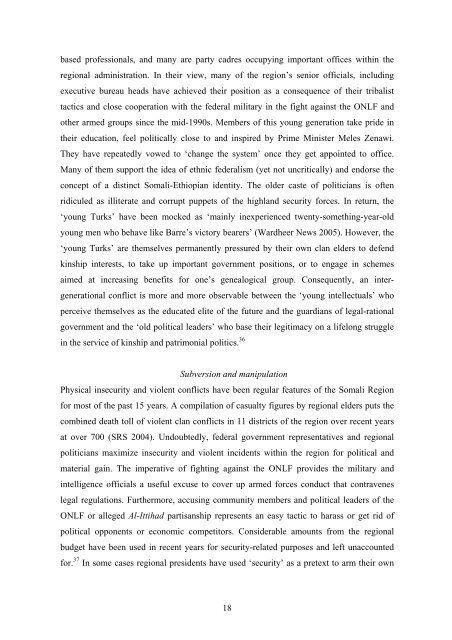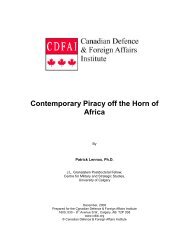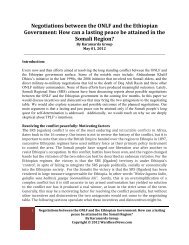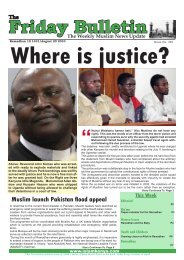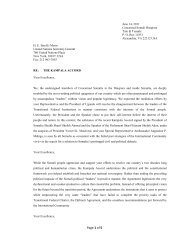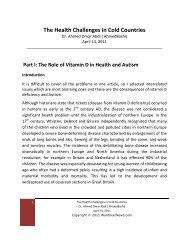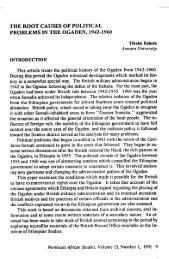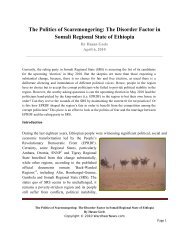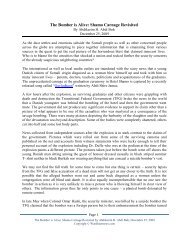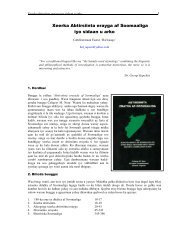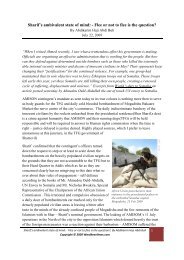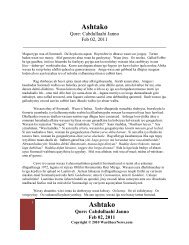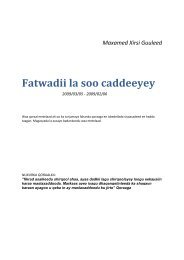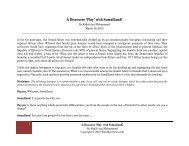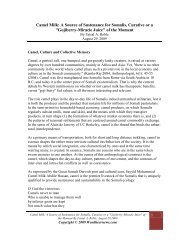View - WardheerNews
View - WardheerNews
View - WardheerNews
Create successful ePaper yourself
Turn your PDF publications into a flip-book with our unique Google optimized e-Paper software.
ased professionals, and many are party cadres occupying important offices within the<br />
regional administration. In their view, many of the region’s senior officials, including<br />
executive bureau heads have achieved their position as a consequence of their tribalist<br />
tactics and close cooperation with the federal military in the fight against the ONLF and<br />
other armed groups since the mid-1990s. Members of this young generation take pride in<br />
their education, feel politically close to and inspired by Prime Minister Meles Zenawi.<br />
They have repeatedly vowed to ‘change the system’ once they get appointed to office.<br />
Many of them support the idea of ethnic federalism (yet not uncritically) and endorse the<br />
concept of a distinct Somali-Ethiopian identity. The older caste of politicians is often<br />
ridiculed as illiterate and corrupt puppets of the highland security forces. In return, the<br />
‘young Turks’ have been mocked as ‘mainly inexperienced twenty-something-year-old<br />
young men who behave like Barre’s victory bearers’ (Wardheer News 2005). However, the<br />
‘young Turks’ are themselves permanently pressured by their own clan elders to defend<br />
kinship interests, to take up important government positions, or to engage in schemes<br />
aimed at increasing benefits for one’s genealogical group. Consequently, an intergenerational<br />
conflict is more and more observable between the ‘young intellectuals’ who<br />
perceive themselves as the educated elite of the future and the guardians of legal-rational<br />
government and the ‘old political leaders’ who base their legitimacy on a lifelong struggle<br />
in the service of kinship and patrimonial politics. 36<br />
Subversion and manipulation<br />
Physical insecurity and violent conflicts have been regular features of the Somali Region<br />
for most of the past 15 years. A compilation of casualty figures by regional elders puts the<br />
combined death toll of violent clan conflicts in 11 districts of the region over recent years<br />
at over 700 (SRS 2004). Undoubtedly, federal government representatives and regional<br />
politicians maximize insecurity and violent incidents within the region for political and<br />
material gain. The imperative of fighting against the ONLF provides the military and<br />
intelligence officials a useful excuse to cover up armed forces conduct that contravenes<br />
legal regulations. Furthermore, accusing community members and political leaders of the<br />
ONLF or alleged Al-Ittihad partisanship represents an easy tactic to harass or get rid of<br />
political opponents or economic competitors. Considerable amounts from the regional<br />
budget have been used in recent years for security-related purposes and left unaccounted<br />
for. 37 In some cases regional presidents have used ‘security’ as a pretext to arm their own<br />
18


